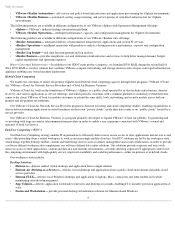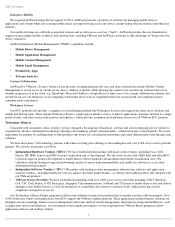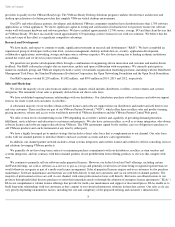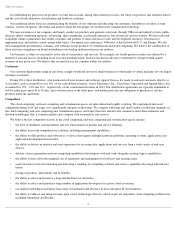VMware 2014 Annual Report Download - page 18
Download and view the complete annual report
Please find page 18 of the 2014 VMware annual report below. You can navigate through the pages in the report by either clicking on the pages listed below, or by using the keyword search tool below to find specific information within the annual report.
Table of Contents
As our vSphere-related products continue to mature, our future revenue growth is increasingly dependent on revenue from our new product
and technology offerings. Our newer initiatives may be less profitable than our established products, and we may not be successful enough in
these newer activities to recoup our investments in them. If any of these risks were to occur, it could damage our reputation, limit our growth and
negatively affect our operating results.
Our vCloud Air offering relies upon a number of third-party providers for data center space, equipment, maintenance and other colocation
services, and the loss of, or problems with, one or more of these providers may impede the growth of our vCloud Air offerings, adversely
impact our plans to expand the service and damage our reputation.
We launched our vCloud Air service offerings in 2013 in the United States and began to expand the services globally in 2014. Our vCloud
Air offerings rely upon third-party providers to supply data center space, equipment maintenance and other colocation services. While we have
entered into various agreements for the lease of data center space, equipment maintenance and other services, third parties could fail to live up to
the contractual obligations under those agreements. For example, a data center landlord may fail to adequately maintain its facilities or provide
an appropriate data center infrastructure for which it is
16
• The success of vCloud Air will depend on the successful global implementation of the offering and building effective go-to-market
strategies. We will need to build sales expertise and infrastructure to support the new offering that is capable of meeting customer
requirements for security, reliability and regulatory compliance. This hybrid cloud offering involves significant capital investment as
well as technology risk, and may not be accepted by customers. Further, this offering may lead our team to reduce the time spent on
selling our existing product portfolio, which could have a material negative impact on revenues.
• As we expand our IaaS and SaaS offerings globally, we may rely more upon joint ventures with established providers of IT products
and services in particular regions, such as our joint venture with the Softbank Group to expand our vCloud Air hybrid cloud service to
Japan. Joint ventures require close ongoing cooperation and commitments from the joint venture partners, and the willingness to devote
adequate resources as required. If we are unable to continue our strategic alignment with joint venture partners or obtain the cooperation
and commitments we are relying upon, our ability to successfully expand our IaaS and SaaS offerings globally will diminish.
• Our new products and services may compete with offerings from companies who are members of our developer and technology partner
ecosystem. Consequently, we may find it more difficult to continue to work together productively on other projects, and the advantages
we derive from our ecosystem could diminish.
• The virtualized end-user computing industry remains in an emerging stage of expansion. Other companies are entering, and are
developing competing standards for, the end-
user computing space, such as Microsoft, Google, Amazon and Citrix, and such companies
are likely to introduce their own initiatives that may compete with or not be compatible with our end-user computing initiatives, which
could limit the degree to which other vendors develop products and services around our offerings and end users adopt our platforms.
• The cloud computing industry is in early stages of expansion. Other companies are entering, and are developing competing standards
for the cloud computing space, such as Microsoft, IBM, Cisco, Google and Amazon, as well as numerous vendor offerings based on the
OpenStack project. These companies are likely to introduce their own initiatives that may compete with or not be compatible with our
cloud initiatives, which could potentially limit the degree to which other vendors develop products and services around our offerings
and end users adopt our platforms.
• Emerging IT sectors, such as those within IaaS, are frequently subject to a “first mover” effect pursuant to which certain product and
service offerings can rapidly capture a significant portion of market share and developer attention. Therefore, if competitive product and
service offerings in these sectors gain broad adoption before ours, it may be difficult for us to displace such offerings regardless of the
comparative technical merit, efficacy or cost of our products and services.
• Developing and launching new technologies in new areas, as we are continuing to do with our VMware NSX virtual networking,
Virtual SAN virtual storage and vCloud Air initiatives, requires significant investments of resources and often entails greater risk than
incremental investments in existing industries. If these investments are not successful, our rate of growth may decline or reverse and our
operating results will be negatively affected.
• In connection with some of our product initiatives, including our web-based services, mobile services and our vCloud Air offering, we
expect that our customers may increasingly use our services to store and process personal information and other regulated data,
increasing our potential exposure to cybersecurity breaches and data loss.
• Marketing and selling new technologies to enterprises requires significant investment of time and resources in order to educate
customers on the benefits of our new product offerings. These investments can be costly and the additional effort required to educate
both customers and our own sales force can distract from their efforts to sell existing products and services.
























